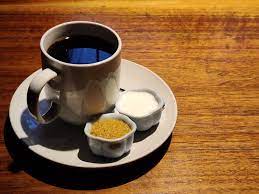Coffee is a beloved morning ritual for many, but for some, it can lead to an unexpected consequence: diarrhea. Let’s explore the potential connection between coffee consumption and gastrointestinal discomfort.
Does drinking coffee give you diarrhea ? Yes, excessive consumption of coffee can lead to diarrhea for some individuals. Caffeine stimulates the muscles in the digestive system, which can result in increased bowel movements. Coffee can have a laxative effect on certain people, especially when consumed in large quantities or on an empty stomach.
The Connection Between Coffee and Bowel Movements

Research indicates that coffee stimulates the digestive system, leading to an increased frequency of bowel movements for many individuals. This effect is thought to be due to a combination of factors intrinsic to coffee.
When coffee enters the system, it interacts with the stomach and intestines in a way that can prompt the urge to defecate.
This effect is seen more prominently in some individuals than others and can vary based on the type and amount of coffee consumed.
Caffeine: A Stimulant for Your Digestive System
Caffeine is known for its ability to stimulate the central nervous system, but it also has a notable impact on the gastrointestinal tract.
It increases the contractions of the muscles in the colon, known as peristalsis, which are responsible for moving digested food through the digestive system. This increase in activity can lead to a quicker transit of waste through the intestines, culminating in the need for a bowel movement.
It’s also worth noting that the impact of caffeine can be immediate for some, with reports of needing to use the bathroom shortly after drinking coffee.
The Role of Acids and Compounds in Coffee
Beyond caffeine, coffee contains a variety of acids and compounds that influence digestive health. Chlorogenic acids, for instance, are significant components in coffee that have been shown to affect gastric acid secretion and gastrointestinal motility.
These acids can increase the acidity in the stomach, which in turn can speed up the process of digestion and lead to quicker bowel movements.
Other compounds, such as N-alkanoyl-5-hydroxytryptamides, found in coffee, are known to stimulate the production of certain gut hormones that can enhance bowel movement. These compounds work in conjunction with caffeine to create a more robust laxative effect.
Coffee’s natural oils and compounds can stimulate the gastrocolic reflex – the physiological reaction that occurs in the colon in response to stretching in the stomach.
When the stomach stretches after eating or drinking, it triggers this reflex, leading to increased colon activity and often an urge to defecate.
Decaf Coffee: Does It Have the Same Effect?
Decaf coffee, which has most of its caffeine removed, still contains the other compounds and acids found in regular coffee. Studies have shown that decaf can still stimulate the digestive system, though usually to a lesser extent than caffeinated coffee.
The presence of chlorogenic acids and other substances in decaf coffee means that it can still increase stomach acidity and promote digestive activity.
For individuals who are sensitive to the laxative effects of coffee, switching to decaf might reduce these symptoms, but it’s unlikely to eliminate them completely.
Irritable Bowel Syndrome (IBS) and Coffee Consumption
For individuals with Irritable Bowel Syndrome (IBS), coffee consumption can be a challenging topic. IBS is characterized by a set of symptoms that include abdominal pain, bloating, and altered bowel habits (constipation, diarrhea, or both).
Since coffee — both caffeinated and decaffeinated — stimulates the gastrointestinal tract, it can exacerbate IBS symptoms.
Coffee can trigger cramps and bloating in IBS sufferers due to its acid content and its ability to stimulate gut hormones. The increased bowel activity caused by coffee can lead to more frequent and urgent bowel movements, which can be particularly uncomfortable for those with IBS.
It’s often recommended that individuals with IBS limit or avoid coffee and other caffeinated beverages to manage their symptoms better.
Lactose Intolerance and Coffee Additives

For many coffee drinkers, it’s not just the coffee itself but also what’s added to it that can cause digestive issues. People with lactose intolerance might experience symptoms of diarrhea, bloating, and gas if they add regular milk or cream to their coffee.
Lactose intolerance is caused by a deficiency of lactase, the enzyme needed to digest lactose, the sugar found in milk.
Preventing Diarrhea From Coffee: Practical Tips
If you love coffee but are struggling with its laxative effects, there are several strategies you can try to mitigate these issues:
Reduce Intake:
Gradually decreasing the amount of coffee you drink each day can help your digestive system adjust.
Choose Low-Acidity Coffees:
Some coffee varieties are lower in acid, which might be gentler on your stomach and intestines.
Try Decaf:
As mentioned, decaf coffee typically has a milder effect on the bowels compared to regular coffee.
Avoid Drinking on an Empty Stomach:
Consuming coffee after a meal can lessen its impact on your digestive system.
Watch Additives:
Be mindful of what you add to your coffee, especially if you’re lactose intolerant or sensitive to artificial sweeteners.
Experiment with Brew Methods:
Cold brew, for example, is typically lower in acid than hot-brewed coffee and may be easier on your digestive system.
Stay Hydrated:
Drinking plenty of water can help mitigate coffee’s dehydrating effects and keep your digestive system running smoothly.
Remember, each person’s reaction to coffee can vary, so it may take some experimentation to find what works best for you. If coffee continues to cause problems, consult with a healthcare professional for personalized advice.
Different Types of Coffee and Their Effects

The type of coffee you drink can significantly impact its effects on your digestive system. Various brewing methods and coffee beans result in different levels of acidity and caffeine content, which can influence how your body reacts.
- Espresso: Typically high in caffeine but consumed in small quantities, espresso can stimulate the digestive system quickly and intensely.
- Drip Coffee: This common brewing method often results in a higher caffeine concentration, which can be more stimulating to the bowels.
- Cold Brew: Known for its lower acidity, cold brew is often gentler on the stomach and can be a better option for those with digestive sensitivities.
- Dark Roast vs. Light Roast: Dark roasts tend to be lower in acidity compared to light roasts, which may make them easier on the digestive system.
- Organic Coffee: Some people find that organic coffee, which is free from certain chemicals and pesticides, is less irritating to their digestive tract.
Understanding Your Body’s Reaction to Coffee
Everyone’s body reacts differently to coffee, and understanding your personal response is crucial. Some people can drink several cups a day without any adverse effects, while others might experience discomfort even with small amounts.
Paying attention to how your body responds to different types and amounts of coffee can help you identify patterns and make adjustments.
- Monitor Your Intake: Keep track of how much coffee you consume and note any digestive symptoms that follow.
- Experiment with Different Types: Try various kinds of coffee and brewing methods to see what works best for your body.
- Consider Timing: Drinking coffee at different times of the day can have varying effects on your digestive system.
- Listen to Your Body: If you experience discomfort, reduce your intake or try a different type of coffee.
- Smoking : Avoid smoking with coffee.
Balancing Coffee Intake and Digestive Health
To enjoy coffee without compromising your digestive health, it’s important to find a balance that works for your body.
Moderation is Key: Limiting your coffee intake can reduce its impact on your digestive system.
Hydration: Ensure you drink enough water to counteract the diuretic effect of caffeine.
Healthy Diet: Eating a balanced diet can support your digestive health and mitigate some of the negative effects of coffee.
Mindful Consumption: Be aware of when and how you consume coffee. Avoid drinking it on an empty stomach and be mindful of additives.
Consult a Professional: If coffee consistently causes digestive issues, consider speaking with a healthcare professional for personalized advice.
Balancing coffee intake with digestive health involves understanding your body’s reactions, experimenting with different types of coffee, and being mindful of your overall diet and hydration. By paying attention to these factors, you can enjoy your coffee while maintaining good digestive health.
Q: Why does coffee make you poop?
A: Coffee can stimulate the production of gastrin, a hormone that can increase colon activity and lead to a bowel movement. It can also trigger contractions in the colon, making you feel the urge to go to the bathroom.
Q: Can drinking coffee cause diarrhea?
A: Yes, drinking coffee can cause diarrhea in some people due to its stimulant effect on the colon and the increase in bowel movements.
Q: What are the negative effects of coffee on bowel movements?
A: Coffee can potentially lead to diarrhea, stomach cramps, and an increased urge to poop, especially in sensitive individuals or when consumed in large quantities.
Q: Can sweeteners in coffee cause diarrhea and stomach cramps?
A: Yes, some artificial sweeteners or excessive consumption of sugar substitutes in coffee can have a laxative effect and lead to diarrhea and stomach cramps in some individuals.
Q: Why do some people experience fewer bowel movements after drinking coffee?
A: While coffee can have a laxative effect for many individuals, some people may experience fewer bowel movements due to variations in digestive sensitivity and response to coffee consumption.
Q: Are there any specific kinds of coffee that are less likely to cause the urge to poop?
A: Generally, darker roasts and cold brews may have a milder effect on bowel movements compared to lighter roasts or highly caffeinated varieties, but individual responses can vary.
Q: Is it true that coffee can make you poop more frequently?
A: Yes, for some people, drinking coffee can lead to more frequent bowel movements due to its stimulating effect on the digestive system.


Leave a Reply